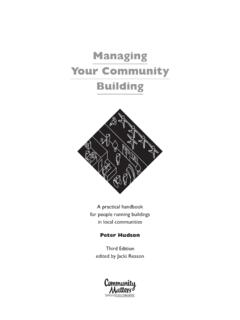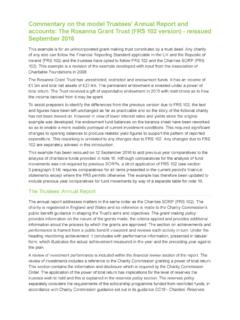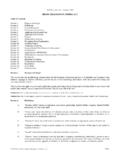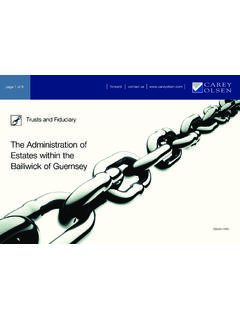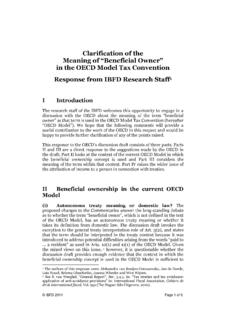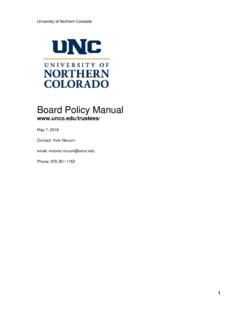Transcription of 17. Trustees Roles and Responsibilities - Village Hall
1 17. Trustees Roles and Responsibilities Contents: 1. 1 2. The Responsibility of Charity 2 3. Liability of 3 4. Good Practice for Charity 4 5. trustee Liability 4 6. Appointment and Retirement of Charity 5 7. Further Information and 6 17. Trustees Roles and Responsibilities 1. Trustees There are over 8,900 Village halls throughout the county and most of these are charitable. The people who manage these halls are therefore the Charity Trustees often referred to as Managing Trustees . What does this mean and what are their Responsibilities ? This Information Sheet is designed to answer these questions and to offer advice and guidance on good practice for Trustees of a Village hall charity.
2 However, it is only a guide and any trustee with specific problems must seek advice from their Rural Community Council Village Hall Adviser, the Charity Commission or a solicitor. Who are Charity Trustees ? The Charities Act 1993 (S97) defines charity Trustees as the persons having the general control and management of the administration of a charity . A Village hall charity will normally have two sets of Trustees (1) Charity or Managing Trustees and (2) Holding or Custodian Trustees . Although they are both Trustees of the charity they have very different functions.
3 In this Information Sheet the term Trustees is to be read as meaning the charity or managing Trustees unless otherwise stated. (i) Charity or Managing Trustees These are the people who manage the charity on a day to day basis and in a Village hall this will be the management committee. When an individual is appointed to the committee and accepts the appointment by signing the minute book (or in any other way set out in the governing document) that person becomes a trustee of the charity. It is important therefore that every new committee member reads through the governing document carefully in order that they are aware of their Responsibilities (see Section 2).
4 (ii) Holding Trustees A Village hall charity will usually provide for a second set of Trustees to be appointed to hold the land or property on behalf of the charity. These are the Holding (or Custodian) Trustees . Their sole function is to hold the title to the property. They should not be involved in the day to day running of the charity, which is the responsibility of the managing Trustees (unless the governing document gives them certain other rules or Responsibilities ). Holding/Custodian Trustees can be either: (i) individuals (ii) a body corporate, a parish council (iii) the Official Custodian for Charities Where individuals are appointed to be Holding Trustees it must be remembered that these individuals will need to be replaced from time to time, as, for example, when the present Trustees die or wish to retire.
5 For this reason many charities prefer to choose a permanent trustee to be the Holding or Custodian trustee , the parish council or the Official Custodian for Charities. By doing this there is no danger that the charity will be left without a Holding trustee for any reason and, in addition, the charity is also saved the periodic expense of appointing new Holding Trustees . In view of the different role of the two types of Trustees it is recommended that a holding trustee should not also be a managing trustee . However, there is no legal restriction against doing so unless it is forbidden by the governing document, for example, in ACRE s Model Documents for Village halls.
6 ACRE August 2000 page 1 17. Trustees Roles and Responsibilities 2. The Responsibility of Charity Trustees The responsibility of the Trustees will depend on whether they are holding Trustees or managing Trustees . (i) Holding Trustees - Holding Trustees are only liable to hold the charity s assets and to carry out any instructions of the managing Trustees in so far as such instructions are not in breach of the governing document. (ii) Managing Trustees - Managing Trustees , however have much greater responsibility. They must ensure that they always act for the good of the charity and its beneficiaries and that in doing so they comply with the terms of the governing document and any legislation.
7 The management committee of a Village hall is comprised of representatives of the user groups plus the elected officers. When a representative of a user group becomes a member of the management committee they become a trustee of the Village hall and they must remember that their first responsibility is to the Village hall charity as a whole and not to their organisation or group. Their Responsibilities can be summarised as follows: To act reasonably and prudently - although there is no statutory definition of reasonable or prudent case law has said that a trustee should exercise the same degree of care in dealing with the administration of the charity as a prudent businessman would exercise in managing his own affairs or those of someone else for whom he was responsible.
8 In practical terms this means, amongst other things, not speculating with the charity s assets; ensuring that the charity assets are fully insured against loss; complying with all and every legal requirement (see below). (a) Insurance - it is very important that Trustees fully insure the charity and its assets against loss; a charitable Village hall will require, as a minimum, buildings and contents insurance, public liability insurance and employers liability insurance. It should be noted that these are likely to be the absolute minimum and many charities will require wider insurance protection and should seek professional advice.
9 In this way, should any problems arise the charity s assets should not be prejudiced. (b) Maintaining accurate financial control - all Trustees must be aware of the charity s finances. Trustees are responsible for maintaining the financial stability of the charity. They must ensure that accurate records are maintained and that they comply with all the accounting requirements required by law. The Charities Act 1993 introduced new requirements which Trustees must follow (for further information on the Charities Act 1993 see Information Sheet VH11). (c) With regard to investments, Trustees are bound by: (i) their governing document trust deed, Will, Scheme of the Commissioners or other formal document (ii) statute - in particular the trustee Investment Act 1961 NB: the provisions in the governing document deed will take precedence over the 1961 Act.
10 ACRE August 2000 page 2 17. Trustees Roles and Responsibilities When deciding where to invest Trustees must have regard to the long term needs of the charity and try to maintain the charity s assets, especially land. The type of investments that Trustees are usually permitted to make are those which are safe and not speculative. There are several investments specifically designed for charities and further information on these is available from the Charity Commission. To act together - Trustees should act together in the administration of the charity. The act of one trustee may render all the Trustees liable and Trustees must ensure that they are kept fully informed; it is no defence for a trustee to claim he/she did not know what was happening.
